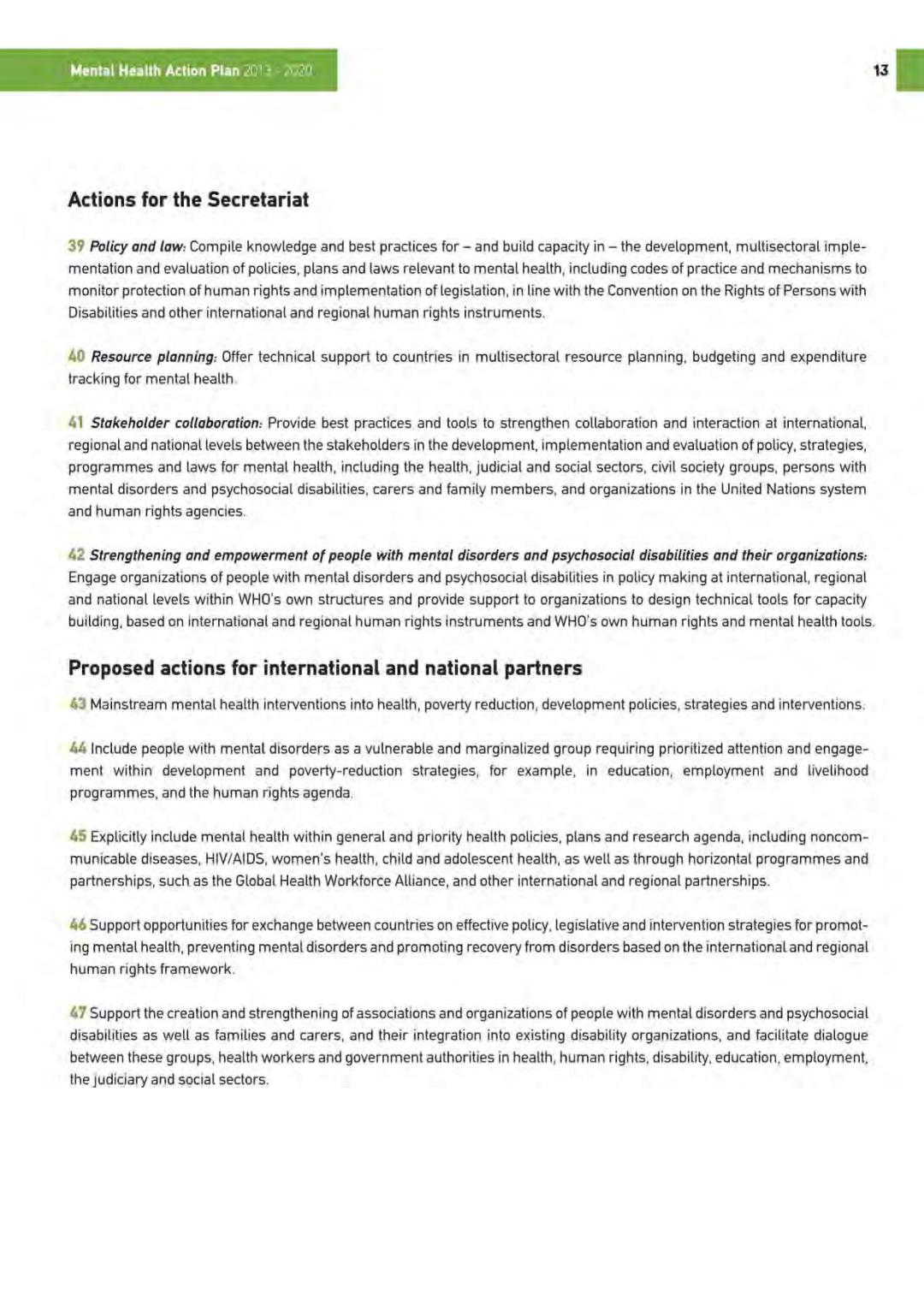正在加载图片...

Mental Health Action Plan 2013-2020 13 Actions for the Secretariat 39 Policy and low:Compile knowledge and best practices for-and build capacity in-the development,multisectoral imple- mentation and evaluation of policies,plans and laws relevant to mental health,including codes of practice and mechanisms to monitor protection of human rights and implementation of legislation,in line with the Convention on the Rights of Persons with Disabilities and other international and regional human rights instruments. 40 Resource planning:Offer technical support to countries in multisectoral resource planning.budgeting and expenditure tracking for mental health. 41 Stokeholder collaboration:Provide best practices and tools to strengthen collaboration and interaction at international, regional and national levels between the stakeholders in the development,implementation and evaluation of policy.strategies, programmes and laws for mental health,including the health,judicial and social sectors,civil society groups,persons with mental disorders and psychosocial disabilities,carers and family members,and organizations in the United Nations system and human rights agencies. 42 Strengthening and empowerment of people with mental disorders and psychosocial disabilities and their organizations: Engage organizations of people with mental disorders and psychosocial disabilities in policy making at international,regional and national levels within WHO's own structures and provide support to organizations to design technical tools for capacity building,based on international and regional human rights instruments and WHO's own human rights and mental health tools. Proposed actions for international and national partners 63 Mainstream mental health interventions into health,poverty reduction,development policies,strategies and interventions. 44 Include people with mental disorders as a vulnerable and marginalized group requiring prioritized attention and engage- ment within development and poverty-reduction strategies,for example,in education,employment and livelihood programmes,and the human rights agenda. 45 Explicitly include mental health within general and priority health policies,plans and research agenda,including noncom- municable diseases,HIV/AIDS,women's health,child and adolescent health,as well as through horizontal programmes and partnerships,such as the Global Health Workforce Alliance,and other international and regional partnerships. 46 Support opportunities for exchange between countries on effective policy.legislative and intervention strategies for promot- ing mental health,preventing mental disorders and promoting recovery from disorders based on the internationaland regional human rights framework. 47 Support the creation and strengthening of associations and organizations of people with mental disorders and psychosocial disabilities as well as families and carers,and their integration into existing disability organizations,and facilitate dialogue between these groups,health workers and government authorities in health,human rights,disability.education,employment, the judiciary and social sectors.Mental Health Action Plan 2(]1 -; )()7(] Actions for the Secretariat 39 Policy and law, Compile knowledge and best practices for - and build capacity in -the development, mullisectoral implementation and evaluation of policies, plans and laws relevant to mental health, including codes of practice and mechanisms to monitor protection of human rights and implem entation of legislation, in line with the Convention on the Rights of Persons with Disabilities and olher international and regional human rights instruments. 40 Resource planning: Offer technical support to countries in multisectoral resource planning, budgeting and expenditure tracking for mental health. 41 Stakeholder collaboration, Provide best practices and tools to strengthen collaboration and interaction at international. regional and national levels between the stakeholders in the development, implementation and evaluation of policy, strategies, programmes and laws lor mental health, including the health, judicial and social sectors, civil society groups, persons with mental disorders and psychosocial disabilities, carers and family members, and organizations in the United Nations system and human rights agencies. 42 Strengthening and empowerment of people with mental disorders and psychosocial disabilities and their organizations: 13 Engage organizations of people with mental disorders and psychosocial disabilities in policy making at international, regional and national levels within WHO's own structures and provide support to organizations to design technical tools for capacity building, based on international and regional human rights instruments and WHO's own human rights and mental health tools. Proposed actions for international and national partners 43 Mainstream mental health interventions into health, poverty reduction, development policies, strategies and interventions. 44 Include people with mental disorders as a vulnerable and marginalized group requiring prioritized attention and engagement within development and poverty-reduction strategies, for example, in education, employment and livelihood programmes, and the human rights agenda. 45 Explicitly include m ental health within general and priority health policies, plans and research agenda, including noncommunicable diseases, HIV/AIDS, women's heallh, child and adolescent health, as well as through horizontal program mes and pa rtnerships, such as the Global Health Workforce Alliance, and other international and regional partnerships. 46 Support opportunities for exchange between countries on effective policy, legislative and intervention strategies for promoting mental health, preventing mental disorders and prom oting recovery from disorders based on the international and reg ional human rights framework. 47 Support the creation and strengthening of associations and organizations of people with mental disorders and psychosocial disabilities as well as families and carers, and their integration into existing disability organizations, and facilitate dialogue between these groups, health workers and government authorities in health, human rights, disability, education, employment, the judiciary and social sectors